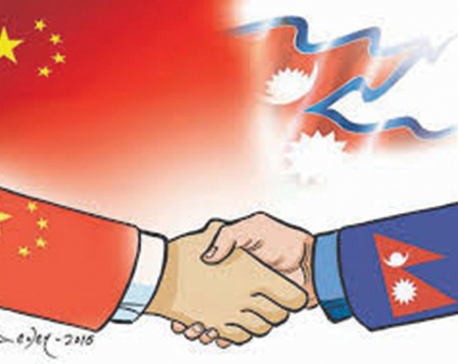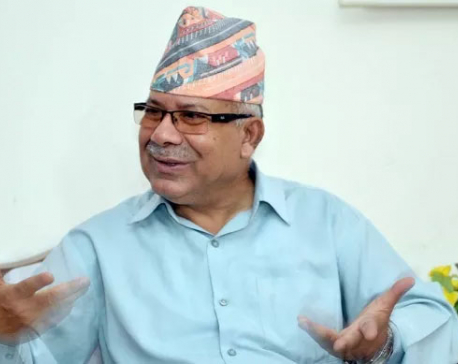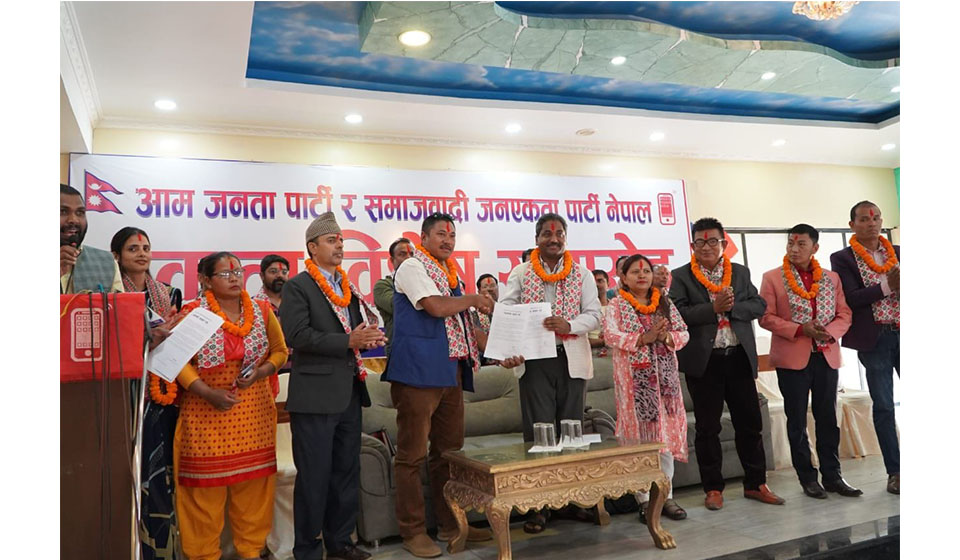
OR
Opinion
Nepal’s Quest for balance in a Multipolar Global Landscape
Published On: August 15, 2023 09:00 AM NPT By: Pranab Raj Koirala

More from Author
“Multipolarization" is a term that we have repeatedly heard in the global political arena over the past two decades. What does "multipolarization" actually mean? It basically refers to the international relations concept that describes a shift away from a unipolar or bipolar world order toward a more complex and diverse global power structure characterized by multiple centers of influence. In a multipolar world, there are several significant and independent actors, such as countries or regions, that possess considerable economic, military, and political power.
When it comes to global politics and international relations, the world has experienced different scenarios such as unipolar, bipolar, and multipolar. Prior to World War I, the world was in a European multipolar state. Following the World War, the rivalry between the United States and the Soviet Union led to a bipolar world situation. In the 1990s, after the collapse of the USSR, we witnessed a unipolar world scenario with the United States taking the lead. Since the beginning of the 2000s, we have seen a shift in global politics with the emergence of new power centers and a decreasing influence of the United States, particularly as power shifts towards Asia.
At the beginning of the 21st century, two or three giant economies are knocking at door, China of course and just behind it, India which are followed by BRICS nations and next Africa. The decline in US influence has presented a chance for Europeans to acknowledge the influential dynamics of transatlantic relationships and assert their own agency in shaping them, instead of simply seeking to distance themselves from such connections.
The BRICS countries, namely Brazil, Russia, India, China, and South Africa, have been actively working towards strengthening themselves and reducing the dominance of the US dollar in international trade by introducing a gold-backed BRICS currency. Powerful nations have shown interest in this initiative. Additionally, discussions are underway regarding a BRICS-EU alliance, which has become a matter of concern for the United States. Furthermore, the ongoing Russia-Ukraine war has been a source of global instability for quite some time now.
In the current context, with global power shifting among various nations, Nepal seeks to establish its presence in world politics and international relations. It raises the question of how Nepal can position itself and what policies it should adopt to cope up with the present world political scenario. This subject is of great interest to all of us, the general public.
Impacts of multipolarization in Nepal
The saying 'Nepal is a yam between two boulders' was coined by Late King Prithvi Narayan Shah, and it has held true from centuries ago to the present time, conveying a consistent meaning. Nepal, located between the rising superpowers China and India, is seen as a fertile land in the eyes of powerful nations due to its strategic location. Being a buffer zone, Nepal has the potential to facilitate trade between China and India, leading to economic prosperity. However, significant progress in such activities has not yet been achieved. Nepal seems concerned about its position amidst the ongoing tussle between China and India. The unstable political situation and the weak diplomatic maneuvering of Nepal have been advantageous for the United States and Western European countries, who have been keenly observing the northern neighbor and utilizing Nepal's soil to establish their dominance in South Asia.
There is a visible presence of Indian, American, European Union (EU), and Chinese influence in Nepali politics. China's political strategy and global infrastructure project, the Belt and Road Initiative (BRI), and the American MCC Compact (Millennium Challenge Corporation) have become contentious issues for many Nepalese. Regardless of whether they understand or not, the debate continues as to whether MCC or BRI is beneficial for Nepal. This has created a heated atmosphere from the streets to the parliament.
Despite opposition from many, the MCC agreement has been approved by the parliament. Additionally, the Belt and Road Initiative (BRI), which was signed in 2017 aiming cross- border connectivity, is still talk of the town. It is debatable whether Nepal's involvement in these initiatives is solely aimed at inviting powerful nations to expand their influences in Nepalese soil or not.
Since the past, Nepali land has been known as a laboratory of various power centers. These power centers have been actively involved in testing their political agendas and increasing foreign influence and intervention in Nepali politics. The interference, manipulation, and financing of various political groups by powerful nations have created increased instability within the country. In this multipolar world, there is a risk of being caught in the middle of conflicts between various power centers.
In recent times, there has been a growing discussion regarding the influence of the BRICS alliance in the global context. In this context, Nepal's ties with the BRICS alliance have also gained momentum, much to the concern of the United States. The increasing closeness of both China and India within BRICS, as well as the potential adoption of the BRICS currency, has raised eyebrows in the international arena regarding Nepal's inclination towards it and potential influence in the regional sphere. As both the US and China are our partners in overall development, Kathmandu has been trying hard to maintain equidistance relationships with Beijing and Washington. The increasing Chinese investment in various development projects and the growing presence of China through BRICS and the Belt and Road Initiative (BRI) in Nepal has raised concerns for the United States, prompting it to counter China's role in the country.
How can Nepal adapt in a multipolar world?
In the current era of a multipolar world scenario, Nepal should first and foremost maintain the continuity of its non-alignment policy, which has been upheld for decades. Instead of leaning towards any particular power group, Nepal should acknowledge the existence of all powers and strive to create behavior that is conducive to Nepal's interests. Nepal should avoid being a vassal state of any powerful nation. It must learn from experiences of Ukraine and avoid being maneuvered by external entities to serve their interests.
Nepal should prioritize its core values and interests rather than working according to external selfish motives. Preserving harmony is crucial in Nepal to avert the disastrous consequences of its diverse population. Therefore, it is imperative for the nation to establish a harmonious environment internally and foster regional integration to safeguard against external influences on its diverse entities. Instances of cultural encroachment have been prevalent in recent times. Hence, it is crucial for the country to take a firm stand in order to safeguard its heritage and culture from foreign encroachment.
Nepal needs to assert its presence, influence, and impact in regional groupings of nations like SAARC and BIMSTEC. Active collaboration and strengthening of ties among member nations can help advance these regional organizations which is fruitful for Nepal to show its presence in global politics.Nepal can strengthen its economic development and global integration by actively fostering relationships with esteemed international institutions like the World Trade Organization, the World Bank, and the International Monetary Fund.
Neglecting the careful study of the feasibility of large developmental projects and hastily financing those through billions of debt is an unsustainable practice that undermines sectors with critical importance such as education, healthcare, agriculture, and others, which could have otherwise benefitted more to the public from increased investments. Nepal must learn lessons from Sri Lanka's economic crisis and the risks associated with debt-trap policies of China. Countries like Nepal should invest in any sector only after thorough evaluation of the expected returns, and in close consultation with experts.
In conclusion, the evolving dynamics of global power, specifically the concept of multipolarity, have garnered significant attention in the realm of foreign policy, underscoring the importance for nations like Nepal to remain cognizant of these changes. Nepal has the potential to adopt a foreign policy that embraces the concept of multipolarity and effectively harnesses the opportunities arising from the shifting dynamics of global power. Nepal must prioritize its independence, sovereignty, economic growth , regional cooperation, good governance, peace and develop a resilient foreign policy to mitigate risk associated with multipolarization.
You May Like This
_20201014060614.jpg)
Nepal abstains from voting as UNHRC adopts resolution against Sri Lanka's human rights record
KATHMANDU, March 23: Nepal has chosen to abstain from voting in the United Nations Human Rights Council on a resolution... Read More...

China wants to build a community with a shared better future for mankind
This year marks the 75th anniversary of the end of World War II and the 75th anniversary of the founding... Read More...

Party's name will be Nepal Communist Party after merger: Leader Nepal
KAILALI, Feb 9: CPN-UML leader Madhav Kumar Nepal said that the name of the new party after merger between CPN-UMLand... Read More...




Just In
- Sunkoshi-Marin Diversion Project’s tunnel construction nears completion, breakthrough scheduled for May 8
- Govt tightens security arrangement for Third Investment Summit 2024
- Pesticide residue found in vegetables in Nepalgunj
- Aam Janata Party and Samajwadi Jana Ekata Party merge
- 1,600 participants confirmed for Nepal Investment Summit
- Ilam-2 by-elections held peacefully, vote count likely to start tonight
- NEA schedules five-day power cut across Kathmandu Valley for underground cable installation
- Hundreds of passengers including foreign tourists in distress as poor visibility halts flights to and from PRIA








-1200x560-wm_20240427144118.jpg)





Leave A Comment